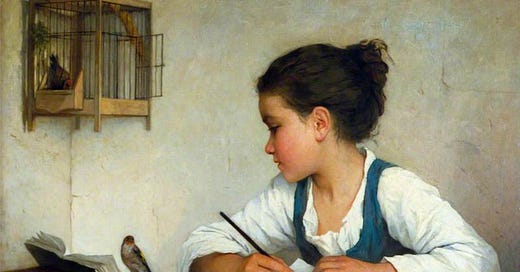Last summer I was determined to study Mary Oliver’s A Poetry Handbook and Rules for the Dance: A Handbook for Writing and Reading Metrical Verse.
I adore Mary Oliver, and after listening to her 2015 On Being interview, (“I got saved by the beauty of the world,”) I wanted to revisit Oliver’s poetry, and Emily Jane Brontë’s poetry and…revisit my own poetry. Unfortunately, last year I made no time for my own poetry, so I think I may try again this summer.
When I was at the hospital last week I saw an advertisement for the literary magazine published by the College of Medicine. It’s open to students, patients, former patients and families of patients. I qualify as three out of the four—so occasionally, I consider submitting something for consideration. But then I think, meh.
In high school I was taught to write a tanka1 and a cinquain.2 Of course, I learned how to compose a haiku. They flowed from the tip of my pen (er, LePen—remember those?) Free verse was my thing, though. Angsty and dark, I wrote poems that (if it had not been the late-1980s and I’d not been sweet-natured for the previous decade) might have earned me a trip to a school psychologist.
Fortunately, I had two wonderfully inspirational English teachers. Both encouraged me to write—and freely express myself, even if it made them uncomfortable. It was no secret my dad—a local business owner—left my mom and I (the summer before my freshman year). It was two weeks before my birthday, on a random day in June.
I had no interest in poetry until that summer, save for a song lyric I wrote when I was eight or nine years old.3 I think sometimes you come to poetry when you need it—or maybe, when you are capable of feeling it.
I'm happiest when most away I can bear my soul from its home of clay On a windy night when the moon is bright And my eye can wander through worlds of light When I am not and none beside Nor earth nor sea nor cloudless sky But only spirit wandering wide Through infinite immensity Emily Jane Brontë
This month I’ve been reading The Complete Poems of Emily Brontë, edited by Janet Gezari. As you know, one of my favorite annotated editions of Wuthering Heights is also edited by Gezari. This short piece—which reminds us of moorland-wandering spirits—is the subtle, simple expression of feeling I most adore.
Poetry of souls and spirits—Emily Jane knew how to express the feelings of the dead. And, the grieving: “Come leave thy dwelling dark and cold/Once more to visit me.”
Reading Brontë’s work, and comparing it to Wuthering Heights, and recently shelving my forgotten volumes (Emily Dickinson, Edna St. Vincent Millay, Sharon Olds, Sylvia Plath, Anne Sexton, Alice Walker), I have been inspired. We’ll see where this goes…
On Friday, June 20, 2025—Solstice—the Wuthering Heights Spring 2025 Read-Along summaries will be archived for paying subscribers-only. If you’re interested in the Autumn 2025 Read-Along, subscribe now...
Let’s explore the Nature & folklore found in Emily Brontë’s Wuthering Heights during the Autumnal Equinox. It’s certainly Heathcliff’s favorite time of year (and, mine).
The tanka is a thirty-one-syllable poem, traditionally written in a single unbroken line. A form of waka, Japanese song or verse, tanka translates as “short song,” and is better known in its five-line, 5/7/5/7/7 syllable count form (Poets.org).
The cinquain, also known as a quintain or quintet, is a poem or stanza composed of five lines. The most common cinquains in English follow a rhyme scheme of ababb, abaab or abccb. (Poets.org).
“I was walking by the lake/and the moonlight shone on my face,” was likely inspired by my love for Barry Manilow and his album Even Now (1978). And even now, decades later, I’m a confessed Fanilow. My son even references Barry occasionally, quipping just the other day, “It’s a real Copacabana situation,” in regard to an embarrassingly-awkward aging celebrity.






Some of my thoughts on reading and writing poetry...
I can only read poetry I feel a connection to. I'm not in formal classes anymore, though I did love them also. We get to read what we want!
Also I just can't read 100 poems in one sitting. 1 poem a day, maybe 3. Then sit and contemplate them.
Finally, for me writing poetry has no rules! That is so freeing to me. Growing up someone was always looking over my shoulder and pointing out grammar mistakes. I still feel that shame. So what I love about writing poetry is none of the rules have to matter! We can write following rules like rhyme and meter, but don't have to!
Up towards the middle I loved reading the poetry just before the Emily Bronte section. Something about the word placement made me slow down and enjoy the words anew. Thank you for your writing and posting!